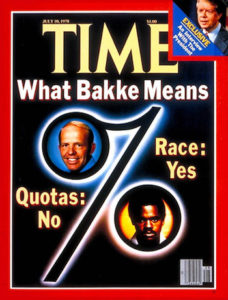
On this date in 1978, the California Supreme Court decided the Bakke v. Regents of the University of California case. In a two-part ruling, the court ordered Alan Bakke (a white man) to be admitted to the University of California at Davis Medical School.
In this landmark case, a majority of the court, five to four, held that the set-aside program at the U.C. Davis Medical School violated Alan Bakke's rights under Title VI of the 1964 Civil Rights Act. The court ruled that he had been discriminated against, but it upheld the legality of affirmative action programs. The court cited Harvard University’s affirmative action program that created guidelines for admission rather than strict quotas.
Bakke, an engineer with high grades, had applied to several medical schools. All the schools he applied to rejected him, but the University of California, Davis encouraged him to reapply. The following year (1976), Bakke applied again and was denied. He then discovered that the university's affirmative action program reserved 16 places for minority candidates regardless of qualifications. Bakke sued the university, claiming he was the victim of "reverse discrimination."
The university argued that quotas were needed to ensure minority admission to college under its affirmative action program.
The Bakke Case: Race, Education, and Affirmative Action
Howard Ball, Copyright 2000
Landmark Law Cases And American Society
Paper
ISBN 0-7006-1046-4